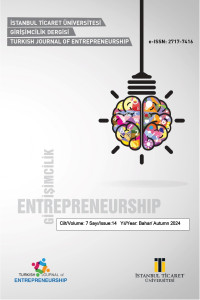Öz
Bu çalışma, girişimcilik finansmanındaki ahlaki tehlikeyi ve bu durumun yatırımcılar ile girişimciler arasındaki ilişkileri nasıl etkilediğini incelemiştir. Ahlaki tehlike, bilgi asimetrisi, temsilcilik sorunları ve risk alma eğilimleri gibi faktörlerle tetiklenir. Bu faktörler, girişimcilerin aşırı risk almasına ve sonuç olarak yatırımcıların mali kayıplar yaşamasına yol açabilir. Çalışma, girişimcilik ekosistemini sağlam ve canlı tutmak için ahlaki tehlikenin anlaşılması ve yönetilmesinin önemini vurgulamaktadır. Şeffaflık, sorumlu risk alma ve etik davranışların teşvik edilmesi, finansman ortamının iyileştirilmesine katkı sağlar. Araştırma, politika yapıcıların, yatırımcıların ve girişimcilerin bu sorunları ele almak için birlikte çalışması gerektiğini belirtir. Sağlıklı bir finansman ortamının sürdürülmesi, bu işbirliği ve etik standartların yükseltilmesi ile mümkündür. Ahlaki tehlikeyi azaltma yollarını keşfeden bu çalışma, girişimcilik finansmanındaki zorluklara yenilikçi çözümler sunarak sürdürülebilir bir girişimcilik ekosistemi için yol gösterici olabilir.
Anahtar Kelimeler
Girişimcilik Finansmanı Ahlaki tehlike Bilgi Asimetrisi Risk Davranışları Yatırımcı Güveni
Kaynakça
- Ahmed, H., & Aassouli, D. (2022). Entrepreneurial finance, agency problems and Islamic ethics: Complementarities and constraints. Venture Capital, 24(1), 25-46.
- Akerlof, G. A., & Shiller, R. J. (2015). Phishing for Phools: The Economics of Manipulation and Deception. Princeton University Press.
- An, J., Duan, T., Hou, W., & Xu, X. (2019). Initial coin offerings and entrepreneurial finance: the role of founders’ characteristics. The Journal of Alternative Investments, 21(4), 26-40.
- Anginer, D., & Demirgüç-Kunt, A. (2018). Bank runs and moral hazard: A review of deposit insurance. World Bank Policy Research Working Paper, (8589).
- Becsky-Nagy, P., & Fazekas, B. (2023). Spurring entrepreneurship with public venture capital in developing industries–evidence from Hungary. Journal of Entrepreneurship in Emerging Economies.
- Bellavitis, C., Filatotchev, I., Kamuriwo, D. S., & Vanacker, T. (2017). Entrepreneurial finance: new frontiers of research and practice: Editorial for the special issue Embracing entrepreneurial funding innovations. Venture Capital, 19(1-2), 1-16.
- Brown, E., & Farrell, M. (2021). The Cult of We: WeWork, Adam Neumann, and the Great Startup Delusion. New York: Penguin Press.
- Business Ethics Case Study On FYRE Music Festival. (n.d.). Retrieved April 5, 2024, from https://www.totalassignment.com/free-sample/business-ethics-case-study-fyre-music-festival
- Carreyrou, J. (2018). Bad Blood: Secrets and Lies in a Silicon Valley Startup. Knopf.
- Cheng, Y., & Doris, A. (2022, April 19). Why wework didn’t work as planned: 4 lessons on corporate governance. Leadership & Management. https://ideas.darden.virginia.edu/wework-lessons-on-corporate-governance Coakley, J., Lazos, A., & Liñares-Zegarra, J. M. (2022). Seasoned equity crowdfunded offerings. Journal of Corporate Finance, 77, 101880.
- Coelho, M., De Meza, D., & Reyniers, D. (2004). Irrational exuberance, entrepreneurial finance and public policy. International Tax and Public Finance, 11, 391-417.
- Cong, L. W., & He, Z. (2019). Blockchain disruption and smart contracts. The Review of Financial Studies, 32(5), 1754-1797.
- Cullen, L. (2019, April 14). Fyre festival: The legal fallout. Ontario Trial Lawyers Association Blog. https://otlablog.com/fyre-festival-the-legal-fallout/
- Denis, D. J. (2004). Entrepreneurial finance: an overview of the issues and evidence. Journal of corporate finance, 10(2), 301-326.
- Dutta, P. K., & Radner, R. (1994). Moral hazard. In The handbook of game theory with economic applications, 2, 869-903. Amsterdam: Elsevier Science.
- Ethics and Social Media: Fyre Festival Fiasco. (n.d.). Retrieved April 5, 2024, from https://franco.com/blog/crisis-management/ethics-and-social-media-fyre-festival-fiasco/ Forlani, D., & Mullins, J. W. (2000). Perceived risks and choices in entrepreneurs' new venture decisions. Journal of business Venturing, 15(4), 305-322.
- Georgiadis, G. (2022). Contracting with moral hazard: A review of theory & empirics. Available at SSRN 4196247.
- Hossain, M., & Oparaocha, G. O. (2017). Crowdfunding: Motives, definitions, typology and ethical challenges. Entrepreneurship Research Journal, 7(2).
- Hott, C. (2022). Leverage and risk taking under moral hazard. Journal of Financial Services Research, 61(2), 167-185.
- Kolhatkar, S. (2018). Black edge: Inside information, dirty money, and the quest to bring down the most wanted man on Wall Street. Random House Trade Paperbacks.
- Lerner, J., & Nanda, R. (2020). Venture capital’s role in financing innovation: What we know and how much we still need to learn. Journal of Economic Perspectives, 34(3), 237-261.
- Martino, P., Bell, G., Rasheed, A. A., & Bellavitis, C. (2022). Entrepreneurial finance and governance. In Oxford Research Encyclopedia of Business and Management.
- Mishra, C.S., Zachary, R.K. (2014). Moral Hazard, Entrepreneurial Incentives, and Risk Mitigation. In: The Theory of Entrepreneurship. Palgrave Macmillan, New York.
- Miglo, A. (2016). Financing of entrepreneurial firms in Canada: an overview. Available at SSRN 2793613.
- Miglo, A. (2022a). Theories of financing for entrepreneurial firms: a review. Forthcoming in International Review of Entrepreneurship.
- Miglo, A. (2022b). Theories of crowdfunding and token issues: a review. Journal of Risk and Financial Management, 15(5), 218.
- Miglo, A., & Miglo, V. (2019). Market imperfections and crowdfunding. Small Business Economics, 53, 51-79.
- Momtaz, P. P. (2021). Entrepreneurial finance and moral hazard: evidence from token offerings. Journal of Business Venturing, 36(5), 106001.
- Paulson, A. L., Townsend, R. M., & Karaivanov, A. (2006). Distinguishing limited liability from moral hazard in a model of entrepreneurship. Journal of political Economy, 114(1), 100-144.
- Prentice, R. (2021, January 12). What didn’t work for ‘wework’. EthicsUnwrapped. https://ethicsunwrapped.utexas.edu/what-didnt-work-for-wework
- Prentice, R. (2019, March 28). Under fyre. EthicsUnwrapped. https://ethicsunwrapped.utexas.edu/under-fyre Salman, K. R. (2023). Exploring Moral Hazard and Adverse Selection in Profit Sharing Contract. International Journal of Professional Business Review: Int. J. Prof. Bus. Rev., 8(3), 7.
- Thakor, A. (2016). Corporate Culture in Banking. Economic Policy Review, 5.
Ayrıntılar
| Birincil Dil | Türkçe |
|---|---|
| Konular | Girişimcilik |
| Bölüm | Makaleler |
| Yazarlar | |
| Erken Görünüm Tarihi | 27 Mayıs 2024 |
| Yayımlanma Tarihi | 28 Mayıs 2024 |
| Gönderilme Tarihi | 2 Mart 2024 |
| Kabul Tarihi | 22 Mayıs 2024 |
| Yayımlandığı Sayı | Yıl 2024 Cilt: 7 Sayı: 14 |


